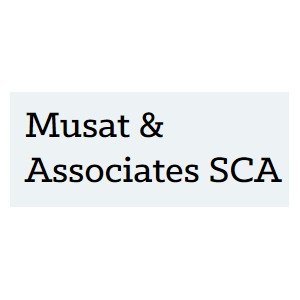Best Education Law Lawyers in Timișoara
Share your needs with us, get contacted by law firms.
Free. Takes 2 min.
List of the best lawyers in Timișoara, Romania
About Education Law in Timișoara, Romania
Education Law in Timișoara, as in the rest of Romania, encompasses a range of legal issues concerning the education system from primary schools to higher education institutions. It covers the rights and responsibilities of students, parents, educators, and educational institutions. Key areas include access to education, educational standards, administrative procedures, and the protection of students' rights. The legal framework aims to ensure equal opportunities and maintain the quality of education, while fostering an environment that is conducive to learning.
Why You May Need a Lawyer
Individuals may seek legal assistance in Education Law for various reasons:
- Disputes between parents and schools: This can involve issues such as school admissions, disciplinary actions, or disagreements regarding a student's educational needs.
- Students' rights: Cases might arise regarding bullying, discrimination, or violation of privacy rights.
- Teacher employment issues: Legal advice may be sought for disputes regarding contracts, wrongful termination, or workplace discrimination.
- Disability rights: Ensuring compliance with laws regarding the education and accommodation of students with disabilities.
- Compliance and regulatory issues: Educational institutions may require legal advice to ensure adherence to regulatory standards and policies.
Local Laws Overview
In Timișoara, Education Law is shaped by national legislation, including the Education Law no. 1/2011, which is the cornerstone of Romanian educational regulation, and various regional directives that impact local implementation. Key aspects include:
- Access to Education: All children have the right to free primary and secondary education in public institutions.
- Inclusive Education: Obligation to provide an inclusive educational environment, accommodating students with special needs.
- Quality Standards: Educational institutions must meet national quality standards and are subject to periodic evaluations.
- Autonomy of Educational Institutions: Schools and universities have a degree of administrative autonomy, allowing them to tailor educational offerings within the regulatory framework.
- Rights and Obligations of Teachers: Educators must adhere to national curriculum standards and maintain professional conduct as outlined by law.
Frequently Asked Questions
1. What is the process for enrolling my child in a public school in Timișoara?
Enrollment typically involves submitting proof of residence, the child’s birth certificate, and previous educational records to the local school office. Specific enrollment periods are set by the Ministry of Education.
2. How can I address issues of bullying at my child’s school?
It's recommended to first report the issue to school authorities for resolution. If unresolved, legal advice may be sought for further action, which can include mediation or formal complaints to educational authorities.
3. What are the rights of children with disabilities in schools?
Children with disabilities have the right to inclusive education and appropriate accommodations to support their learning. Schools are mandated to provide necessary resources and support.
4. How are teachers' employment disputes typically handled?
Employment disputes may be resolved through administrative channels, such as grievance procedures, or may require legal intervention for issues like wrongful dismissal or discrimination claims.
5. What should I do if I believe my child has been unfairly expelled from school?
You may appeal the decision through the school's formal grievance process or seek legal advice to assess the possibility of bringing a case to the educational authorities or judiciary.
6. How does one ensure a private educational institution meets legal standards?
Private institutions must be accredited and subject to the same regulatory standards as public schools. Verification can be done through the Ministry of Education or local inspection bodies.
7. Are there legal protections against discrimination in education in Timișoara?
Yes, Romanian law prohibits discrimination on various grounds, including ethnicity, disability, and gender, within educational settings.
8. What options are available for homeschooling in Timișoara?
Homeschooling is permitted under Romanian law but regulated by the Ministry of Education. Parents must comply with specific procedures and reporting requirements.
9. Is bilingual education available, and what laws apply?
Bilingual education options are available in Timișoara, especially in areas with linguistic minorities, supported by the National Education Law that promotes linguistic rights.
10. Can foreign nationals access education in Timișoara?
Yes, foreign nationals are entitled to education within the Romanian system, subject to similar enrollment processes and documentation requirements as local students.
Additional Resources
For further assistance and information about Education Law in Timișoara, consider contacting:
- National Education Ministry - Provides guidelines, policy information, and resources on education law and rights.
- Timiș County School Inspectorate - Offers local oversight and support for educational issues and disputes.
- Protecția Copilului (Child Protection Services) - Can assist with cases of student rights violations and child welfare.
- Legal Aid Bureaus - Offer pro bono legal services for individuals in need of legal support in educational matters.
Next Steps
If you require legal assistance in Education Law:
- Gather all relevant documentation and information regarding your case.
- Contact a local lawyer specializing in Education Law for a consultation.
- Consider seeking initial advice from legal aid bureaus if cost is a concern.
- Engage with local educational authorities if the issue involves administrative processes or regulatory compliance.
- Remain informed about changes in educational legislation and your rights within the educational system.
Lawzana helps you find the best lawyers and law firms in Timișoara through a curated and pre-screened list of qualified legal professionals. Our platform offers rankings and detailed profiles of attorneys and law firms, allowing you to compare based on practice areas, including Education Law, experience, and client feedback.
Each profile includes a description of the firm's areas of practice, client reviews, team members and partners, year of establishment, spoken languages, office locations, contact information, social media presence, and any published articles or resources. Most firms on our platform speak English and are experienced in both local and international legal matters.
Get a quote from top-rated law firms in Timișoara, Romania — quickly, securely, and without unnecessary hassle.
Disclaimer:
The information provided on this page is for general informational purposes only and does not constitute legal advice. While we strive to ensure the accuracy and relevance of the content, legal information may change over time, and interpretations of the law can vary. You should always consult with a qualified legal professional for advice specific to your situation.
We disclaim all liability for actions taken or not taken based on the content of this page. If you believe any information is incorrect or outdated, please contact us, and we will review and update it where appropriate.










